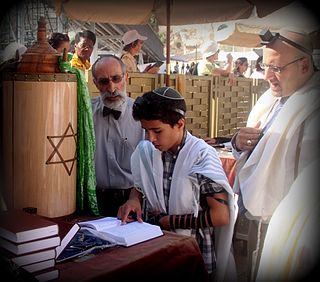
A bar mitzvah (masc.), or bat mitzvah (fem.) is a coming of age ritual in Judaism. According to Jewish law, before children reach a certain age, the parents are responsible for their child's actions. Once Jewish children reach that age, they are said to "become" b'nai mitzvah, at which point they begin to be held accountable for their own actions. Traditionally, the father of a bar or bat mitzvah offers thanks to God that he is no longer punished for his child's sins.

Song of Ascents is a title given to fifteen of the Psalms, 120–134, each starting with the superscription "Shir Hama'aloth", or, in the case of Psalm 121, Shir Lama'aloth. They are also variously called Gradual Psalms, Fifteen Psalms, Songs of Degrees, Songs of Steps, songs for going up to worship or Pilgrim Songs.
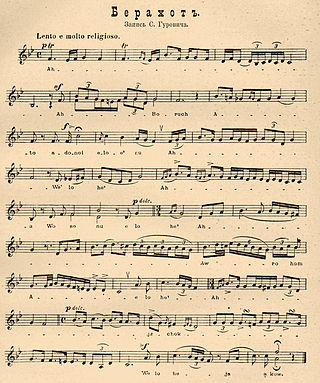
The Amidah, also called the Shemoneh Esreh, is the central prayer of the Jewish liturgy. Observant Jews recite the Amidah at each of three daily prayer services in a typical weekday: morning (Shacharit), afternoon (Mincha), and evening (Ma'ariv). On Shabbat, Rosh Chodesh, and Jewish festivals, a fourth Amidah (Mussaf) is recited after the morning Torah reading, and once per year, a fifth Amidah (Ne'ilah) is recited, around sunset, on Yom Kippur. Due to the importance of the Amidah, in rabbinic literature, it is simply called "hatefila". According to legend, the prayer was composed by the rabbis of the Anshei Knesset HaGedolah. Accordingly, in Judaism, to recite the Amidah is a mitzvah de-rabbanan, i. e., a commandment of rabbinic origin.

Simchat Torah, also spelled Simhat Torah, is a Jewish holiday that celebrates and marks the conclusion of the annual cycle of public Torah readings, and the beginning of a new cycle. Simchat Torah is a component of the Biblical Jewish holiday of Shemini Atzeret, which follows immediately after the festival of Sukkot in the month of Tishrei.
Yohanan ben Zakkai, sometimes abbreviated as ריב״ז ribaz for Rabbi Yohanan ben Zakkai, was a tanna, an important Jewish sage during the late Second Temple period during the transformative post-destruction era. He was a primary contributor to the core text of Rabbinic Judaism, the Mishnah. His name is often preceded by the honorific title Rabban. He is widely regarded as one of the most important Jewish figures of his time, and his escape from the Roman destruction of Jerusalem may have been instrumental in Rabbinic Judaism's survival post-Temple. His tomb is located in Tiberias within the Maimonides burial compound.

Targum Onkelos is the primary Jewish Aramaic targum ("translation") of the Torah, accepted as an authoritative translated text of the Five Books of Moses and thought to have been written in the early second century CE.

Marriage vows are promises each partner in a couple makes to the other during a wedding ceremony based upon Western Christian norms. They are not universal to marriage and not necessary in most legal jurisdictions. They are not even universal within Christian marriage, as Eastern Christians do not have marriage vows in their traditional wedding ceremonies.
The Hebrew Bible makes reference to a number of covenants with God (YHWH). These include the Noahic Covenant set out in Genesis 9, which is decreed between God and all living creatures, as well as a number of more specific covenants with Abraham, the whole Israelite people, the Israelite priesthood, and the Davidic lineage of kings. In form and terminology, these covenants echo the kinds of treaty agreements existing in the surrounding ancient world.
Bible prophecy or biblical prophecy comprises the passages of the Bible that are claimed to reflect communications from God to humans through prophets. Christians usually consider the biblical prophets to have received revelations from God.

Lech-Lecha, Lekh-Lekha, or Lech-L'cha is the third weekly Torah portion in the annual Jewish cycle of Torah reading. It constitutes Genesis 12:1–17:27. The parashah tells the stories of God's calling of Abram, Abram's passing off his wife Sarai as his sister, Abram's dividing the land with his nephew Lot, the war between the four kings and the five, the covenant between the pieces, Sarai's tensions with her maid Hagar and Hagar's son Ishmael, and the covenant of circumcision.

Toledot, Toldot, Toldos, or Toldoth is the sixth weekly Torah portion in the annual Jewish cycle of Torah reading. The parashah tells of the conflict between Jacob and Esau, Isaac's passing off his wife Rebekah as his sister, and Isaac's blessing of his sons.
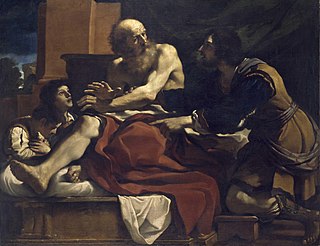
Vaychi, Vayechi or Vayhi is the twelfth weekly Torah portion in the annual Jewish cycle of Torah reading and the last in the Book of Genesis. It constitutes Genesis 47:28–50:26. The parashah tells of Jacob's request for burial in Canaan, Jacob's blessing of Joseph's sons Ephraim and Manasseh, Jacob's blessing of his sons, Jacob's death and burial, and Joseph's death.

Vayishlach or Vayishlah is the eighth weekly Torah portion in the annual Jewish cycle of Torah reading. In the parashah, Jacob reconciles with Esau after wrestling with a "man." The prince Shechem rapes Dinah, whose brothers sack the city of Shechem in revenge. In the family's subsequent flight, Rachel gives birth to Benjamin and dies in childbirth.
In Judaism, yetzer hara is a term for humankind's congenital inclination to do evil. The term is drawn from the phrase "the inclination of the heart of man is evil", which occurs twice at the beginning of the Torah.
Jose the Galilean, d. 15 Av, was a Jewish sage who lived in the 1st and 2nd centuries CE. He was one of the Tannaim, the rabbis whose work was compiled in the Mishna.
The books of the New Testament frequently cite Jewish scripture to support the claim of the Early Christians that Jesus was the promised Jewish Messiah. Scholars have observed that few of these citations are actual predictions in context; the majority of these quotations and references are taken from the prophetic Book of Isaiah, but they range over the entire corpus of Jewish writings.
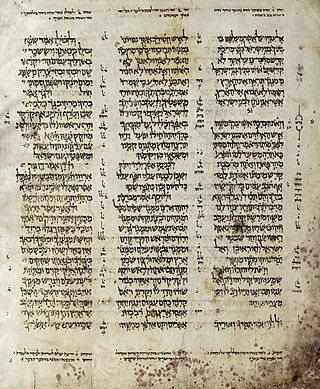
V'Zot HaBerachah, VeZos HaBerachah, VeZot Haberakha, V'Zeis Habrocho, V'Zaus Haberocho, V'Zois Haberuchu, Wazoth Habborocho, or Zos Habrocho is the 54th and final weekly Torah portion in the annual Jewish cycle of Torah reading and the 11th and last in the Book of Deuteronomy. It constitutes Deuteronomy 33:1–34:12. The parashah sets out the farewell Blessing of Moses for the 12 Tribes of Israel and concludes with the death of Moses.
Tanhuma bar Abba was a Jewish amora of the 5th generation, one of the foremost aggadists of his time.
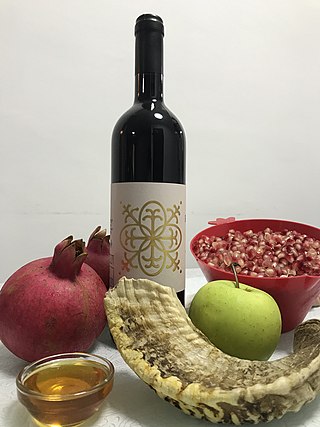
Rosh Hashanah is the New Year in Judaism. The biblical name for this holiday is Yom Teruah. It is the first of the High Holy Days, as specified by Leviticus 23:23–25, that occur in the late summer/early autumn of the Northern Hemisphere. Rosh Hashanah begins ten days of penitence culminating in Yom Kippur, as well as beginning the cycle of autumnal religious festivals running through Sukkot which end on Shemini Atzeret in Israel and Simchat Torah everywhere else.

Rebecca appears in the Hebrew Bible as the wife of Isaac and the mother of Jacob and Esau. According to biblical tradition, Rebecca's father was Bethuel the Aramean from Paddan Aram, also called Aram-Naharaim. Rebecca's brother was Laban the Aramean, and she was the granddaughter of Milcah and Nahor, the brother of Abraham. Rebecca and Isaac were one of the four couples that some believe are buried in the Cave of the Patriarchs, the other three being Adam and Eve, Abraham and Sarah, and Jacob and Leah. Most scholars have considered Rebecca's historicity uncertain.












